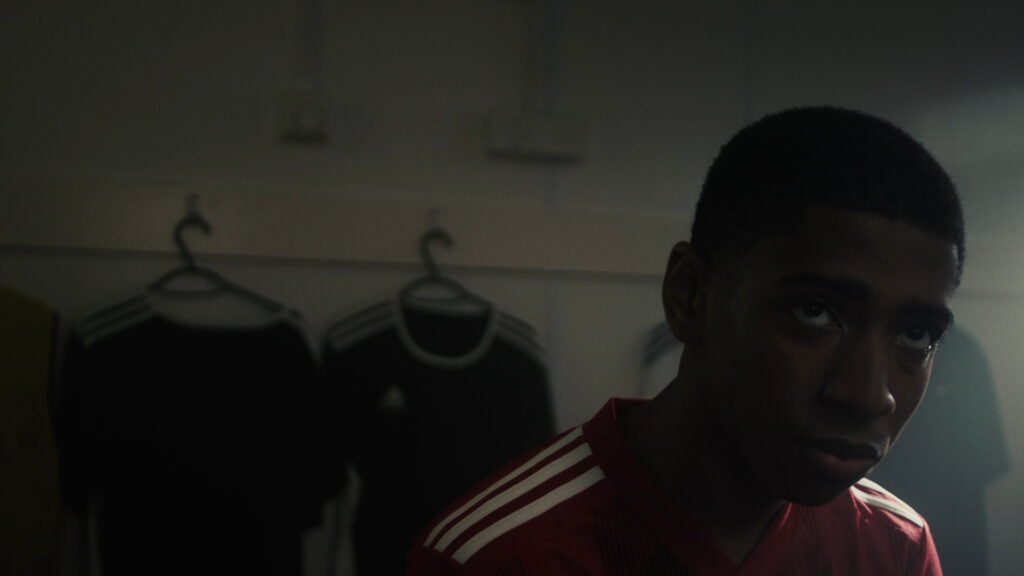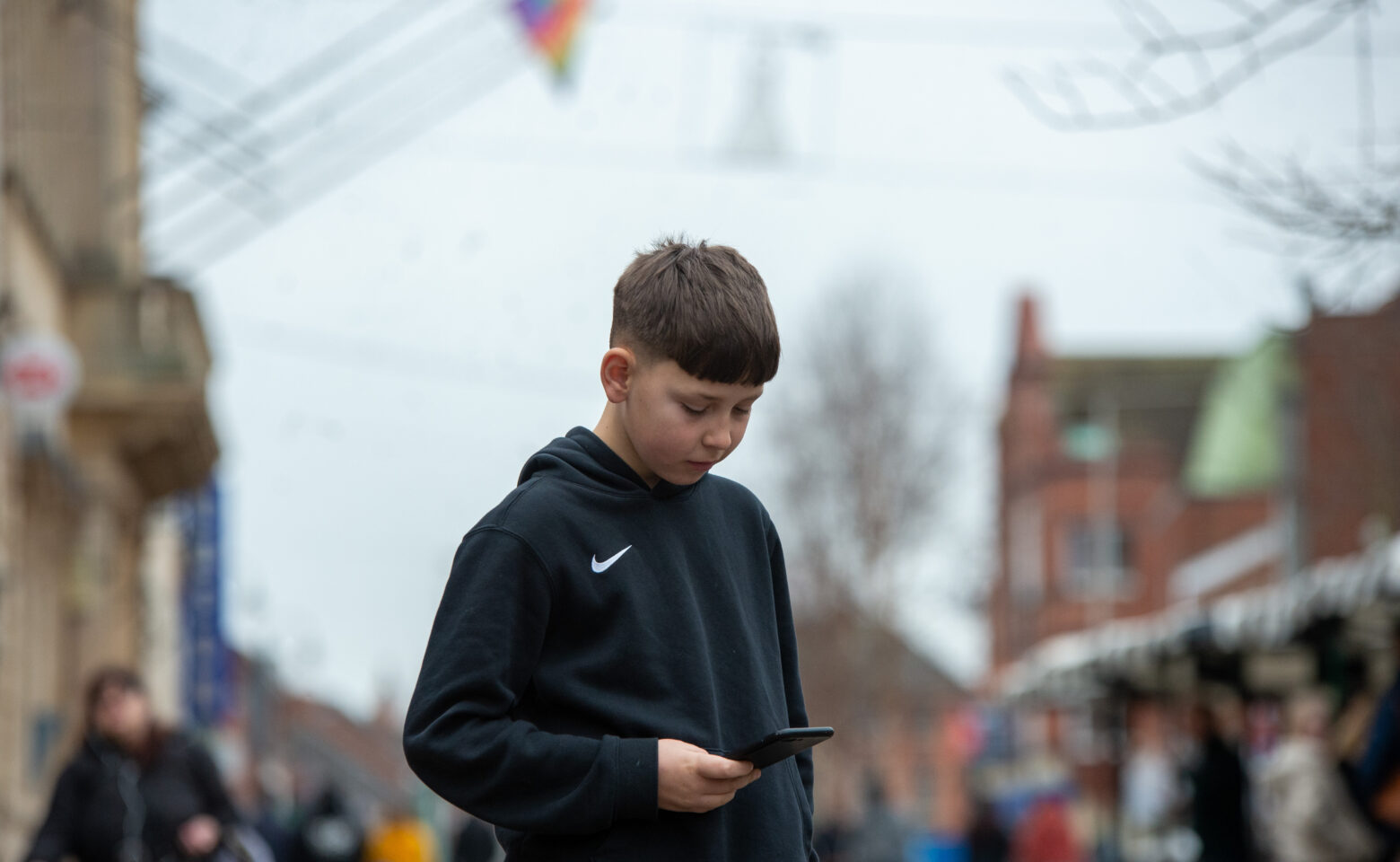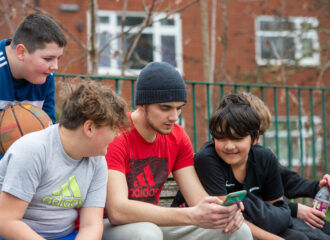What is child criminal exploitation?
Child criminal exploitation (CCE) is when young people are manipulated by gangs and criminals into committing crimes, like holding onto or selling drugs, carrying weapons and committing theft or burglary. County lines is the most common type of activity, where young people are recruited to distribute drugs from cities into smaller towns and rural areas.
A young person may be caught up in CCE and not even realise it, because to them being part of a gang feels like being with their friends. They feel important, protected and respected.
Some young people are also made to feel like they have no choice but to commit these crimes, and they’ll be scared to speak out about what is happening.

Are You Listening?
Are You Listening? is our campaign that focuses on child criminal exploitation and gangs. We want to raise awareness of how young people could get caught up in gang activity and committing crimes, as well as what we can do together to help stop it.
Watch and download our resources to help you understand more about gang activity, and how to help a young person you’re worried about.
For more information about the ‘Are You Listening?’ film click here
What is a gang?

It’s not illegal for a young person to be in a gang. There are different types of gangs and not every one is criminal or dangerous. However, gang membership can be linked to illegal activity – particularly organised criminal gangs involved in trafficking, drug dealing and violent crime.
These types of gangs can exploit children and young people to carry out criminal activity for them.
Most young people are not involved in gangs and want nothing to do with them. However, those who are can do significant damage, emotionally and physically, on their communities, and families and friends, as well as themselves
Spot the signs of child criminal exploitation and gangs

There are some signs to look out for if you’re worried a young person has joined a gang, or is being criminally exploited.
It may be hard to spot at first, but the sooner you’re able to talk to the young person the more you’ll be able to help them.
- They’re getting lots of texts and phone calls but are being secretive about who they’re talking to.
- You’ve noticed a drop in grades and a reluctance from them to go to school.
- They’re not showing up at home, school or their clubs and activities.
- They have new clothes, phones or games and can’t explain how they paid for them.
- They’re not hanging around their usual friends but are spending time with new people, who are sometimes older.
- Going missing from home or not showing up to school or regular after-school groups or clubs.
- Become involved in low-level criminality such as antisocial behaviour.
What is county lines?
County lines is a form of criminal exploitation where urban gangs persuade, coerce or force children and young people to store drugs and money and/or transport them to suburban areas, market towns and coastal towns. It can happen in any part of the UK and is against the law and a form of child abuse.
Dedicated mobile phone lines or “deal lines” are used to help facilitate county lines drug deals. Phones are usually cheap, disposable and old fashioned, because they are changed frequently to avoid detection by the police.
Gangs use the phones to receive orders and contact young people to instruct them where to deliver drugs. This may be to a local dealer or drug user, or a dealer or drug user in another county.
Phrases that young people may use to refer to county lines include:
‘running a line’,
‘going OT/out there’
‘going country’
‘going cunch’.
The NSPCC have more specific information on protecting children from county lines here
County Lines Terminology
Gangs will often recruit and force children (sometimes as young as 12) to carry drugs between locations, and sometimes also sell them. They will often intimidate, use violence and sexually exploit them to maintain control,
Young girls can be groomed and forced into relationships with gang members often being made to perform sexual acts.
The act of travelling to another city or town to deliver or sell drugs.
The act of selling drugs. Trapping can refer to the act of moving drugs from one town to another or the act of selling drugs.
A building used as a base from where drugs are sold or manufactured. These houses are often are occupied by someone (usually adult drug users but sometimes young people are forced to stay in trap houses).
This refers to when someone owns a mobile phone specifically for the purpose of running and selling drugs.
Drug dealers take over the home of a vulnerable individual and use it as their base for selling/manufacturing drugs. Commonly, drug users are targeted and are offered “free” drugs in exchange. Though the elderly and disabled individuals are also targeted.
I’m worried about child criminal exploitation and gangs
There are things you can do to help prevent a young person getting involved with criminal exploitation and gangs.
Talk to them about the dangers and consequences of gangs, child criminal exploitation and county lines. They may think that these people are their friends and won’t be aware they’re caught up in something more sinister.
Be available and take an interest. Don’t pile on the pressure for them to tell you exactly what they’re up to, but encourage them to talk about how they feel and what’s happening inside and outside of school.
Let your child know that you’re there to listen to them, with no judgement. If they can come to you and talk without fear of being told off, they are more likely to open up.
Talk to their teachers and other parents, the more trusted people there are that can keep an eye on your child, the safer they may feel.
Let them know that gangs who undertake child criminal exploitation make young people feel like they have no choice, and will scare them into not speaking out about what is happening. But there is always a choice.
Remember to:
- Educate your child about the consequences of being in a gang.
- Show interest by getting involved in your child’s school activities and hobbies.
- Respect your child’s feelings and attitudes and help them develop self-esteem.
- Be a good listener and try to understand their mindset.
- Listen carefully to your children’s choice of words.
- Communicate with them about their concerns and fears.
- Watch closely for negative influences.
- Try to get to know your child’s friends and their parents.
- Learn to lean on other people and talk about your concerns, it can be hard to handle and balance stresses on our own.
- Improve your own self-esteem so your children can model themselves after the most important role model – you.
I need help and support
If you think a young person is already involved in criminal exploitation and gangs, help and support is available.
- Contact the police immediately if you’re worried that a young person is in danger.
- Talk to them and listen. If you’re worried about a child, or know that they’re involved with a gang or criminal group, try to be aware of where they are when they’re out, who they’re with and what they’re doing on social media.
- You can contact the NSPCC helpline (08088 005 000) and speak to trained professionals about what is happening. They can take action and point you to the right services and support agencies in your area.
- Contact Children’s Services. You can find them through your local council
- Talk to the safeguarding lead at the child’s school and ask for support.
Further Information
Government advice to parents and carers on gangs.
Children’s Society on spotting the signs of gang activity.
Safeguarding Network provides help and support on child criminal exploitation.
Not In Our Community is full of resources to help you and young people understand more about child criminal exploitation and child sexual exploitation.





